October 30, 2012 // Uncategorized
The Doctrine of Purgatory
On All Souls’ Day (November 2) and indeed throughout the month of November, we are called in a special way to remember “our brothers and sisters who have fallen asleep in the hope of the resurrection” (Eucharistic Prayer II). We remember especially the Holy Souls in purgatory.
In this Year of Faith, we are called to grow in our understanding of the truths of our Catholic faith. One such truth is the doctrine of purgatory. This teaching is rooted in ancient Christian tradition, yet it is not accepted by all Christians. It is important that we seek to understand the doctrine of purgatory and what the Church means when it teaches about the existence of purgatory.
The word “purgatory” comes from the Latin purgare, which means “to purify” or “to purge.”
The Catechism of the Catholic Church describes purgatory as a state of final purification after death and before entrance into heaven for those who died in God’s friendship, but were only imperfectly purified; a final cleansing of human imperfection before one is able to enter the joy of heaven (1031; cf. 1472)
Jesus declared in the Beatitudes: Blessed are the pure in heart, for they shall see God (Matthew 5:8). In order to see God face to face in heaven (the beatific vision), our hearts need to be totally purified. This purification can begin on earth, but, if we die without this purification being complete, this will occur in purgatory, a condition of existence in which every trace of attachment to evil is eliminated and every imperfection of the soul corrected.
Throughout Church history, there has been much speculation about purgatory. A saint from the sixteenth century, Catherine of Genoa, is well-known for her vision of purgatory. Pope Benedict XVI explains that (unlike many others), “Catherine did not see purgatory as a scene in the bowels of the earth: for her it is not an exterior but rather an interior fire. This is purgatory: an inner fire.”
“The soul,” Saint Catherine says, “presents itself to God still bound to the desires and suffering that derive from sin and this makes it impossible for it to enjoy the beatific vision of God.” Catherine asserts that God is so pure and holy that a soul stained by sin cannot be in the presence of the divine majesty. Pope Benedict continues: “We too feel how distant we are, how full we are of so many things that we cannot see God. The soul is aware of the immense love and perfect justice of God and consequently suffers for having failed to respond in a correct and perfect way to this love; and love for God itself becomes a flame, love itself cleanses it from the residue of sin.”
I think the words of Saint Catherine of Genoa and of our Holy Father help us to understand better the doctrine of purgatory. It is a state or condition in which God’s love permeates one’s heart, a fire or light that purifies. This fire is also painful since it brings awareness of our sins, our offenses against God who loves us so much. I think of the pain we experience when we hurt someone we love.
Now what about prayers and sacrifices for the Holy Souls in purgatory? From her earliest beginnings, the Church has prayed for the deceased, especially the Eucharistic Sacrifice. This has always been the practice of the Church. And the Church believes as she prays (recall the famous maxim lex orandi, lex credendi: “the law of prayer is the law of faith”).
This reminds us of the important doctrine of the communion of saints. We profess in the Apostles’ Creed that we believe in “the holy catholic Church, the communion of saints.” This communion of the Church includes the saints who dwell in the glory of heaven, those who have died and are being purified in purgatory, and those disciples of Jesus who are still pilgrims on earth.
We are all united to Christ and to one another as brothers and sisters in Christ. The saints in heaven intercede for us. As we live in communion with one another on earth, we also live in communion with the saints in heaven. And we live in communion with the faithful departed who are undergoing purification. We help them with our prayers and they intercede for us as well. We are all part of the one family of God.
Blessed John Paul II wrote about purgatory and the communion of saints as follows: Those who find themselves in the state of purification are united both with the blessed who already enjoy the fullness of eternal life, and with us on this earth on our way toward the Father’s house. Just as in their earthly life believers are united in the one Mystical Body, so after death those who live in a state of purification experience the same ecclesial solidarity which works through prayer, prayers for suffrage and love for their other brothers and sisters in the faith. Purification is lived in the essential bond created between those live in this world and those who enjoy eternal beatitude.
I encourage all to pray for the dead in a special way during this month of November, for our deceased loved ones and for all the Holy Souls experiencing the trial and suffering of purgatory because of the punishment due to sin which separates them from God. They await the eternal joy of the beatific vision. Let us recognize our solidarity with them by entrusting them to the Lord in our prayers and sacrifices. I especially encourage the holy practice of offering Mass intentions for the deceased, an act of true charity and love.
The best news. Delivered to your inbox.
Subscribe to our mailing list today.







